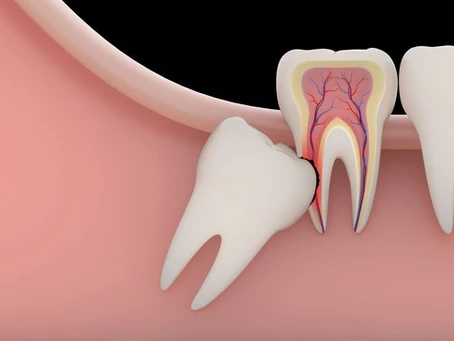Are you someone who had to recently listen to your oral surgeon saying, “You need to get your wisdom tooth removed”? If you are nodding a yes to this question with anxiety creeping up on your shoulder, you are not alone. A trip to the dental clinic can be scary, especially when your oral surgeon suggests removing your third molar. However, oral surgery gets a bad rep without any valid reason. Getting your wisdom tooth extracted can be an uncomfortable experience, but as your oral surgeon, we strive to make this experience as calming and comfortable for you as possible.
So, why do you need to get your wisdom teeth removed?
Wisdom teeth, also called third molars, are the last teeth to come out in the mouth. These are the large teeth at the back of your mouth, which usually start erupting by the age of 18. Third molars are notorious for coming out at unusual angles and positions or sometimes not coming out. This erratic erupting pattern of the third molars puts them at risk of decay, infections, and even cysts, which necessitates removal as there is no way around it. Third molars are highly susceptible to dental cavities and gum diseases since this area is not easily accessible by regular oral hygiene methods.
Listed below are some of the most common reasons for third molar (wisdom tooth) extraction –
-
l The third molar has come out at an unusual angle, is tilted, and a source of pain and trauma to the inside of the mouth.
-
It is infected or decayed.
-
There is an abscess or cyst with the tooth. Sometimes, the swelling of the infected and untreated third molar can progress to involve the neck and other facial spaces, which causes airway obstruction. This is an emergency and, if not treated swiftly, can lead to death.
-
When there is less or no space between the second molar and the lower jawbone (mandibular ramus), the third molar does not get a chance to come out, thus creating constant pressure on the remaining teeth. This leads to excruciating pain, and it necessitates its removal.
-
Pericoronitis is an infection of the gum flap surrounding the third molar when it has not erupted vertically. The bacteria from these infections can travel to the bloodstream and affects other organs, causing sepsis. To prevent complications like these, third molars are removed.
PROCESS OF WISDOM TOOTH REMOVAL
Once the oral surgeon has determined that your third molar needs to be extracted, they will schedule your surgery. If you feel uncomfortable or anxious about dental surgeries, talk to our surgeon and tell them how you feel. They will take extra measures to ensure you are comfortable and your wisdom tooth surgery takes place uneventfully. After your initial examination on the day of your oral surgery, the procedure of extraction begins. Wear loose and comfortable clothing during your oral surgery appointment and ensure you have had proper rest the day before.
The oral surgeon will first inject a local anesthetic to numb the intended area. Once adequate anesthesia has been achieved, you will not feel any pain or sensation in that area. Next, our surgeon will make a few small incisions in your gums to gain access to the hidden tooth. In some situations where the crown portion of the tooth is visible, this step may not be required. On the other hand, some oral surgery cases may also need bone cutting to access the tooth. Once proper access is gained, our oral surgeon will take the help of oral surgery forceps and elevators to luxate and remove the tooth out of the socket. The socket is later checked, and the gums are closed with the help of sutures.
After your oral surgery, our oral surgeon will instruct you on how to care for your extraction site and prescribe some antibiotics and painkillers. Ensure you are following these instructions diligently and taking your medicines on time for proper healing. If you have any questions or would like to schedule an appointment, contact Premier Choice Dental Center and our exceptional oral surgery team will be there to assist you.


